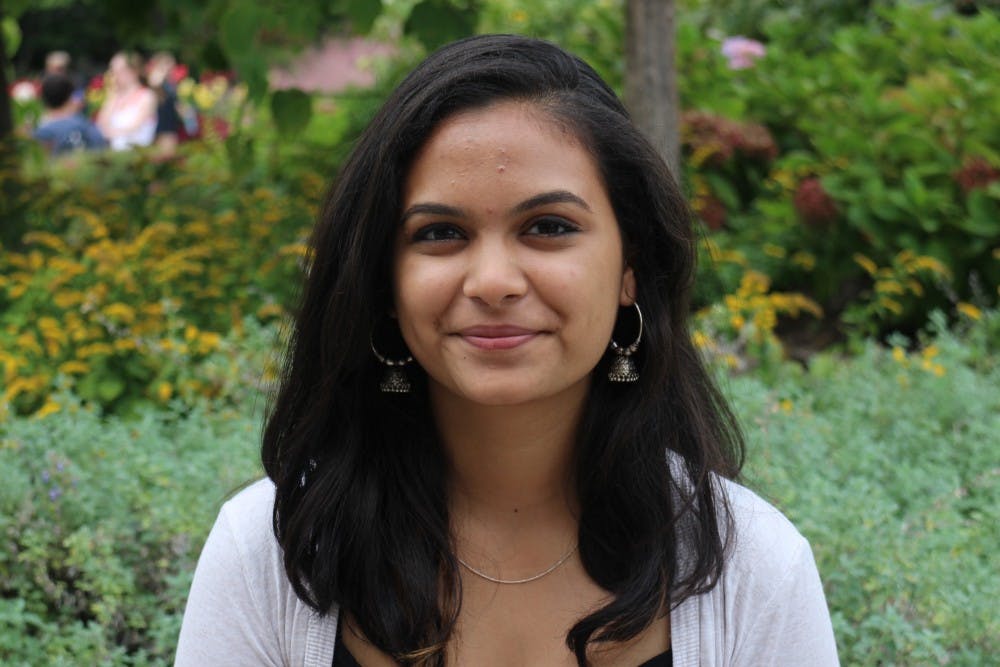It isn’t just the arrival of Valentine’s Day that has couples around campus holding hands and stealing kisses between classes. You see public displays of affection year-round but gestures like make out sessions on the quad and sensual shoulder rubs on the couches in the Davenport continue to surprise me. Out of all the ways that I anticipated culture shock as an international student, public displays of affection (PDA) was not one that I thought I would struggle with.
Having lived in India during the years when I liked and dated boys, showing affection was always a tricky task. PDA and specifically Valentine’s Day is often looked at as a Western evil. My high school had a loosely enforced no-touch policy. Having the casual, by the locker, kissing sessions that you see on TV was a fantasy we knew we would never experience. We tried to mimic it by finding empty classrooms and having a friend guard the door to ensure that a teacher wouldn’t walk in on you. If you were caught, the consequences could end up being as severe as being expelled.
Recently, surveillance and policing of couples during Valentine’s Day has increased. Several right-wing Hindu groups harass and try to force couples to get married if they are found together. Furthermore, kissing in public, between a married couple or otherwise, is frowned upon. While the law doesn’t explicitly say so, obscene and sexual acts are illegal and a quick lip lock is usually shuffled into that category.
My friends and I couldn’t wait to escape to the West for college. I never thought I’d have an adjustment period for this of all things. I recall walking back to my room with a boy one night during my freshman year and immediately freaking out when he kissed me in the hallway. I thought, “What if someone sees us?!” I had to remind myself that I was in college and that this was not a weird thing to do. With AU being a multicultural community, I was curious as to whether this western way of showing affection was really the norm. Were my reactions overdramatic? My conversations with various international students say differently.
Syeda Siddiqi, Nigeria
Siddiqi is originally from Bangladesh and lived in Abuja, Nigeria for 13 years. In Nigeria, the seeing PDA is rare.
“In high school, [PDA] was strictly not allowed and you would get suspended. Even holding hands wasn’t allowed,” Siddiqi said.
Religion also plays a big role in shaping Nigerian society she said, as half the population is Muslim and the other half is Christian. When she came to AU, Siddiqi said she would see people kissing in public.
“ How do you not feel weird?” Siddiqi said.“For me, I like hand holding and pecks, but I don’t feel comfortable doing anything more than that.”
Lanjing Zhang, China
Zhang said that while China doesn’t have any strict rules about PDA, other than not having sex in public, she would not say that it is very common to see couples canoodling.
“Younger generations are very different from the elders,” she said. “My parents, they don’t touch each other at all, but the younger [people] are pretty much like the Americans. With a large population, there are couples more conservative and some others more open.”
For the most part, Zhang said that PDA is only commonly seen at clubs and other party settings.
Tariq Shahwan, Jerusalem
Shahwan went to a relatively liberal international high school, but kissing was off limits.
“West Jerusalem is a little bit more liberal…But in Arab culture and society, for example in Jordan or in the West Banks in Palestine, public displays of affection were like unheard of,” he explained. While people might be out on dates, “you’ll never see them being affectionate towards each other in public.”
Regina Sanchez, Mexico
For Sanchez, showing affection towards your significant other is a normal and important part of Mexican culture.
“There is some level of respect with older family though,” she explained.
Her father was not comfortable with her kissing her ex-boyfriend in front of him, but a hug goodbye or a kiss on the cheek was O.K. Sanchez emphasized that the mindset is changing and younger parents tend to be more comfortable and even encouraging of affection.
PDA isn’t a bad thing, but it is important to recognize that it changes from culture to culture. Regardless of how you feel, recognizing what your partner might not be comfortable with and what is culturally different for them is important in maintaining a healthy and respectful relationship. If you see some people give you a strange look as you kiss your significant other this Valentine’s Day, know that it might not be because they’re bitter; they might just be surprised.





